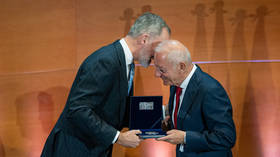Months after Twitter shadow-bans RT, Putin signs law to fine & block social media giants that censor Russian media sources

Russian President Vladimir Putin has approved new legislation that could see foreign social media companies punished for discriminating against the country’s media outlets. This year, RT and Sputnik have been censored on Twitter.
The bill explicitly forbids censorship based on reasons such as nationality, language, and origin, as well as “in connection with the introduction of political or economic sanctions against Russia.”
Once found guilty, a foreign network, such as YouTube or Facebook, could be subject to sanctions in the form of fines, the slowing down of traffic, or even a complete block.
Earlier this year, US tech giant Twitter took action against RT and other publicly-funded Russian media outlets, subjecting their accounts to a shadow ban. This means that they are now undiscoverable via the website’s search function.
As well as making tweets much harder to find, Twitter also labeled several Russian sources as “state-affiliated media,” despite not doing so for Western equivalents, such as America’s state-run RFE/RL and the British government-backed BBC.
After the bill was proposed, President Putin noted that the country should not “shoot itself in the foot” with any retaliatory actions against foreign media, but it is “absolutely obvious and understandable to any sane person” that these companies are discriminating against Russian outlets.
The law was introduced last month by a group of parliamentarians, including MP Alexander Khinshtein and Senator Aleksey Pushkov. According to Pushkov, the law wasn’t written with the aim of blocking the websites, but to introduce legal responsibility for censorship.
Also on rt.com Russia opens case against Google over failure to remove banned extremist, X-rated & suicidal content from its search results“The goal is not to block resources, but is to clarify the rules according to which these companies must operate in Russia,” he explained, speaking to Moscow news outlet TASS.
Another of the bill’s authors, MP Anton Gorelkin, explained that “the state should always have a hard option in reserve for particularly malicious violators of the law,” and this law does that.
If you like this story, share it with a friend!













